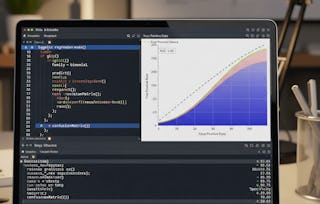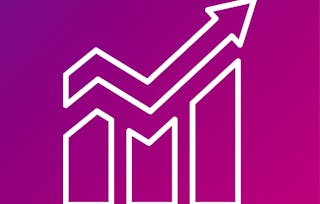This course introduces learners to the analysis of binary/dichotomous outcomes. Learners will become familiar with fundamental tests for two-group comparisons and statistical inference plus prediction more broadly using logistic regression. They will understand the connection between prevalence, risk ratios, and odds ratios. By the end of this course, learners will be able to understand how binary outcomes arise, how to use R to compare proportions between two groups, how to fit logistic regressions in R, how to make predictions using logistic regression, and how to assess the quality of these predictions. All concepts taught in this course will be covered with multiple modalities: slide-based lectures, guided coding practice with the instructor, and independent but structured exercises.

Logistic Regression and Prediction for Health Data
Ends soon: Gain next-level skills with Coursera Plus for $199 (regularly $399). Save now.

Logistic Regression and Prediction for Health Data
This course is part of Data Science for Health Research Specialization


Instructors: Philip S. Boonstra
Included with
Recommended experience
What you'll learn
Understand how binary outcomes arise and know the difference between prevalence, risk ratios, and odds ratios
Use logistic regression to estimate and interpret the association between one or more predictors and a binary outcome
Understand the principles for using logistic regression to make predictions and assessing the quality of those predictions
Skills you'll gain
Details to know

Add to your LinkedIn profile
7 assignments
See how employees at top companies are mastering in-demand skills

Build your subject-matter expertise
- Learn new concepts from industry experts
- Gain a foundational understanding of a subject or tool
- Develop job-relevant skills with hands-on projects
- Earn a shareable career certificate

There are 3 modules in this course
This module introduces you to binary outcomes, including how they arise, how to calculate proportions, and how to compare proportions between two groups.
What's included
11 videos8 readings2 assignments3 discussion prompts
In this module, you will be introduced to the ubiquitous logistic regression, one of the most common tools for measuring the association between one or more predictors and a binary outcome.
What's included
11 videos2 readings3 assignments
This module introduces you to tools for assessing the quality of a fitted logistic regression model.
What's included
16 videos3 readings2 assignments1 discussion prompt
Earn a career certificate
Add this credential to your LinkedIn profile, resume, or CV. Share it on social media and in your performance review.
Offered by
Explore more from Data Analysis
 Status: Preview
Status: Preview Status: Free Trial
Status: Free TrialImperial College London
 Status: Preview
Status: Preview Status: Free Trial
Status: Free Trial
Why people choose Coursera for their career





Open new doors with Coursera Plus
Unlimited access to 10,000+ world-class courses, hands-on projects, and job-ready certificate programs - all included in your subscription
Advance your career with an online degree
Earn a degree from world-class universities - 100% online
Join over 3,400 global companies that choose Coursera for Business
Upskill your employees to excel in the digital economy
Frequently asked questions
To access the course materials, assignments and to earn a Certificate, you will need to purchase the Certificate experience when you enroll in a course. You can try a Free Trial instead, or apply for Financial Aid. The course may offer 'Full Course, No Certificate' instead. This option lets you see all course materials, submit required assessments, and get a final grade. This also means that you will not be able to purchase a Certificate experience.
When you enroll in the course, you get access to all of the courses in the Specialization, and you earn a certificate when you complete the work. Your electronic Certificate will be added to your Accomplishments page - from there, you can print your Certificate or add it to your LinkedIn profile.
Yes. In select learning programs, you can apply for financial aid or a scholarship if you can’t afford the enrollment fee. If fin aid or scholarship is available for your learning program selection, you’ll find a link to apply on the description page.
More questions
Financial aid available,

